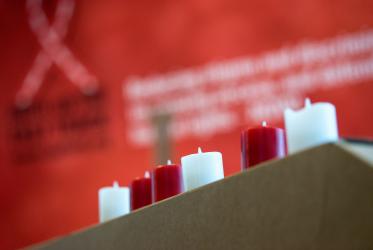A workshop in Tanzania created a “safe space” in which adolescents, church leaders, theologians, development practitioners and others could share their feelings and ideas about HIV response.
Participants, who described the workshop as “transformative,” said they felt both informed and energized.
The World Council of Churches Ecumenical HIV and AIDS Initiatives and Advocacy (WCC-EHAIA), in collaboration with the YWCA and the International Network of People Living with or Personally Affected by HIV, held the workshop in Dar es Salaam, Tanzania on 28 March - 1 April.
Rev. Pauline Wanjiru Njiru, East Africa regional coordinator for WCC-EHAIA, and Prof. Ezra Chitando, theology consultant for WCC-EHAIA, facilitated the workshop.
Adolescents shared their challenges in life in general, and within churches and homes in particular, while adults shared their fears and challenges in responding to the needs of adolescents. The goal of the workshop was for young people and elders to better understand each other’s point of view so that churches will be better equipped to be relevant in HIV responses.
The workshop was founded on a model of providing a safe space and “spaces of grace.” In many African communities, young people are not expected to attend the gatherings of adults and contribute their ideas. However, in order to address sexual and reproductive health rights and HIV, families and the church have to take young people’s contributions seriously. They must create “safe spaces” for life-transforming conversations. The workshop presented an opportunity for young people and church leaders to openly and honestly engage on issues of sexuality, gender, culture and tradition. The facilitators used contextual bible study, dialogue and presentations by specialists to promote equal chances to share and contribute ideas.
“We have learned a lot from our young people, and we would like to create safe spaces in our church to keep learning and guiding our young people,” one church leader said.
The young people said girls who get pregnant before they are married are severely stigmatized. This has pushed young people to use conventional medicine to prevent pregnancy after they have been exposed to pre-marital sex. The girls said that they actually fear being pregnant more than being infected with HIV. For the facilitators, the “SAVE” — or safer practices, access to treatment, voluntary counseling and testing, and empowerment — methodology was useful in explaining to young people the dangers of HIV and how to prevent it. The SAVE methodology includes abstinence and delay of sexual activity.
At the opening session, Bishop Dr Steven W. Mang’ana, Mennonite Church in Tanzania, expressed gratitude to the WCC team for the timely workshop. He highlighted that women, children and the youth form a large part of believers and are greatly affected by HIV and AIDS. He asked participants to further explore God’s call to Christians in the context of HIV and AIDS.
Church leaders who participated in the workshop agreed to network to support each other in HIV response.
“Workshops such as this increase a sense of solidarity within and among churches,” said Rev. Dr Nyambura Njoroge, WCC-EHAIA coordinator. “If we are going to see progress in addressing sexual and reproductive rights, upholding the dignity of all, and achieving social transformation, churches and families must continue to create safe spaces where meaningful dialogue can occur.”
World Council of Churches Ecumenical HIV and AIDS Initiatives and Advocacy







